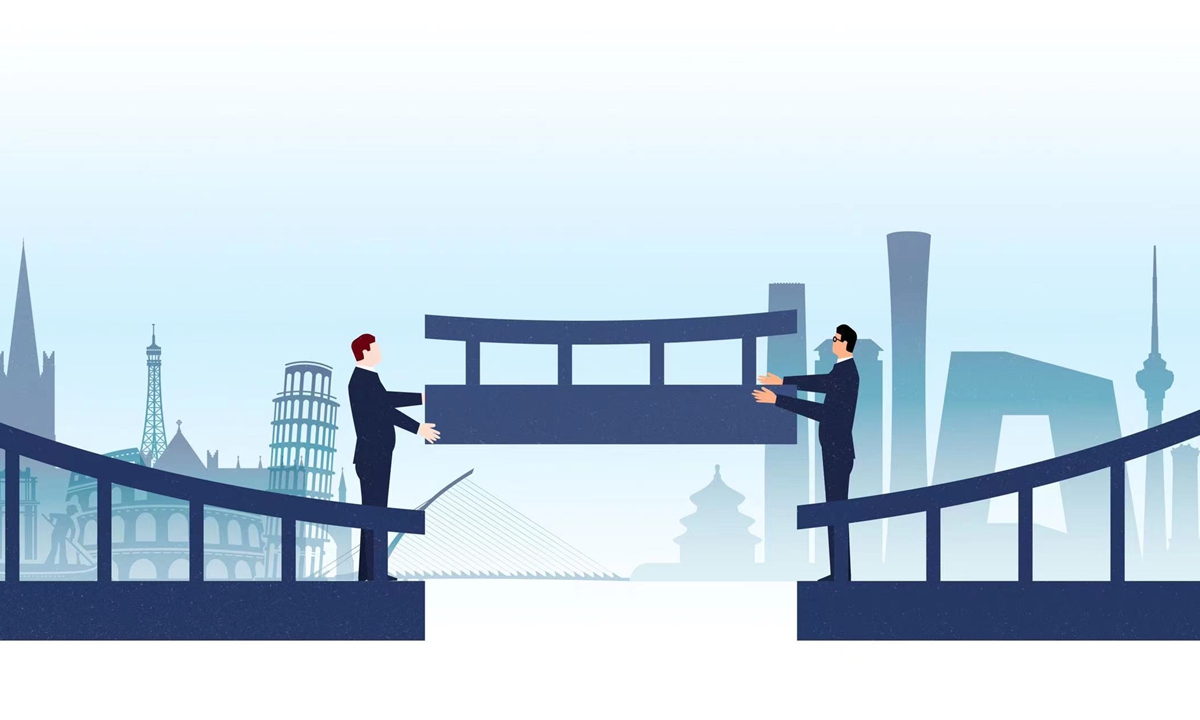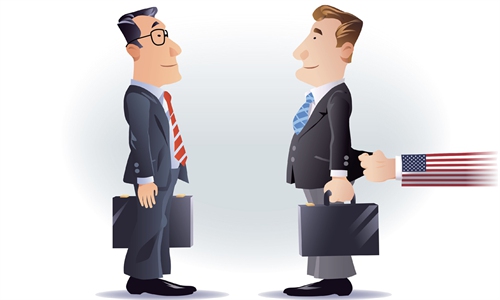
Photo: GT
Editor's Note:
Amid the EU leaders' visit in succession, China has drawn the attention of the world. What are the common interests between China and the EU? How to understand the rising awareness of strategic autonomy in Europe? What kind of pressure will the US further exert to influence Europe's policy on China? During his unofficial trip to China, Mick Wallace (Wallace), Member of the European Parliament, shared his views on these issues with Global Times (GT) reporters Wang Zixuan and Li Aixin.
GT: What impressed you most during your trip in China? From your observations here, what do you think is the biggest misunderstanding of China in the West? What are the reasons for such misunderstanding?
Wallace: The most impressive part for me is the people. We were very welcome here. I've never been to China before. You can read all you like about the country, but if you haven't been there, you don't really feel the same. I suppose. We had nine days in total, it was a great experience for us. It helps us to kind of understand China a little more.
GT: You said in Beijing that the EU needs to develop an independent approach on China that best serves the interests of the peoples of Europe and China. What do you think is the biggest consensus and common interest between China and the EU, and what kind of China-EU relationship is more in line with the fundamental and long-term interests of the EU?
Wallace: We are pro-peace, we hope to see international law upheld by everybody and want multilateralism to work. Countries are building up a lot more than the needed amount on defense. We see the militarization of Europe, and it's very concerning when the money that could be spent on housing, health and education has been spent on guns, tanks and fighter planes.
The Americans have been at war almost every year since their existence, with less than 20 years in peace. America was built on colonialism. While America was a great country in some ways and probably still is in some ways, the impact it had outside its borders has not been a positive one in many ways. They have used European military to safeguard their financial investments and interests around the world at the great expense of the ordinary people in every country. Now we think every government should work in the best interest of the citizens in that country, which most need the protection and help.
To be honest, in the European Parliament, we are regularly accused because we challenge US imperialism, we want Europe to have a different path. We challenge neoliberalism. We are accused of being pro-China, pro-Russia, pro-Iran or pro-Syria. We are not pro any government, instead we want peace in the world, and we want countries to work together, and we don't want an expansion of the militarization that's been happening.
GT: At the same time of your trip in China, several EU leaders also visited China. What do you think of this situation? Is it a reflection of higher awareness of strategic autonomy in Europe? Will this situation continue in the future?
Wallace: The idea of European leaders coming to China is good, the same as I think it's a good idea for the Chinese to go there. Macron came while he's in a lot of trouble at home with his own people. I think he behaved himself well and European Commission Chief Ursula von der Leyen was less impressive. I listened to her speech and I have a feeling that she was lecturing the Chinese a bit like in the colonial fashion. Don't do this, don't do that. She warned China not to give arms to Russia, because it will only escalate the war.
But sadly, that's what Europe is doing. We were escalating the war by giving guns to Ukraine, and we haven't tried to establish peace, which is shocking for us. Instead, we have supported a US proxy war. That is a disaster for everybody, particularly the Ukrainians, also for the Russians, for all the people of Europe and beyond that as well. We condemn the failure of the EU to make any effort to bring about dialogue and diplomacy, the effort by China to introduce an idea for peace is welcomed by us. But sadly, the Americans and the Europeans don't seem to be interested.
GT: We also notice that the US is anxious about this situation, and the US media speculated that China was driving a wedge between Europe and the US through France. What's your opinion? What other aspects do you think the US may pressure Europe in the future to influence Europe's policy on China? How should Europe respond?
Wallace: We've spoken many times in the parliament. We have felt since 2019 that the US has been trying to drive a wedge between Europe and China. We believe that this is not in the interests of Europe. Anyone who thinks that China is going to invade Europe with military is mad. It's not going to happen, and it doesn't make any sense. So we don't think that China is a threat to our security.
Obviously, we also don't think that China is a threat to security to people of America, but as we've said many times, we do believe that America feels the threat of China to its financial supremacy, and that's a big problem for the Americans. For the US, it is using Europe as a tool against China. When I said that Europe should have an independent policy toward China, I believe Europe should have an independent policy toward every country, and we shouldn't be dictated by the Americans. We should think for ourselves and do what's in the best interests of our people.
Having a healthy, peaceful relationship with China makes sense for the people of Europe; while fighting with China, behaving aggressively and sending warships to the South China Sea, as far as we are concerned, is not positive. It's not in the interests of both the peoples in Europe and China. Everybody's going to spend more money on defense, which is stupid. That doesn't make any sense.
GT: You have mentioned a survey last year showed over 70 percent of EU citizens favored peace rather than efforts to continue punishing Russia. Why does the EU still refuse to listen to its citizens and still support the proxy war of US and its NATO allies? What does that mean for the European people?
Wallace: The survey was conducted by the European Council for Foreign Relations. It was a very extensive survey, over 70 percent of the people said they preferred peace rather than continuing to punish Russia, now I reckon it's over 80 percent.
The EU says it wants to undermine Russia's strength, and it doesn't make any sense to us. We are better off working with Russia rather than fighting with it. But the politicians don't represent and serve their citizens very well. There's a disconnect between the part of the political class and the citizenry.
The ordinary people don't want war, yet the EU fails to work for peace or to look for dialogue and diplomacy. In this terrible war, it's the less privileged people that are dying, whether in Ukraine or Russia, but the rich guys at the big table are making the decisions. It is the politicians and big businesses that are supporting the US empire, and that's very sad.
GT: In terms of Ukraine war, what do you think of China's peace plan, including "respecting the sovereignty of all countries," "abandoning the Cold War mentality," "ceasing hostilities," "resuming peace talks," etc, and in which aspect China and Europe can work together to end the war?
Wallace: It would be great if China played a strong role. I'd like to see China put a little bit of pressure for negotiations. I'd like to see the EU put pressure on the Americans and the Ukrainians to bring an end to the war. I'd like to see everybody use their influence in a positive way.
China is a world player. Now China is going to be probably the strongest country in the world in my lifetime. We want China to work with countries in a peaceful way and trade with them in a way that benefits the people. We feel that China has the potential to be a positive player on the world stage. I also want the EU to work with China.
GT: What impact did the Nord Stream Sabotage have on Europe? As the victim, why do European politicians have little interest in exposing the truth? What is your attitude toward the investigation?
Wallace: The Nord Stream sabotage was an act of terrorism. It was an incredible environmental crime and the largest release of methane emissions in the history of mankind. It's obvious the Russians didn't blow up their own pipe. If they don't want any gas to go through the pipe, they can just turn off the gas on their end. So why would they just try it in the first place? They're not that stupid. Seymour Hersh said in his article that Biden was directly involved and made the decision. Is it true? We don't know. Until the EU shows a serious appetite for finding the truth of this, it is very hard for them to have any credibility in giving out about anything.
GT: In the European Parliament, have you ever come under pressure because of your position toward China? How will you tackle such pressure and insist on your position in the future?
Wallace: I take unorthodox positions in politics, going against the mainstream is challenging. Because the media will attack you as they try to stop you from saying something different from what they want to hear. But if you think that I'm going to stop talking because of the media, no, I'm not, it makes us stronger.
It's not nice to be attacked by the media all the time. We don't like it, but we have to work without fear or without favor. We don't support any government, we support truth, we support peace, and we want countries to be run in a good manner. We want society organized to benefit all the citizens. We want governments to work in the best interests of those who need help. So we will speak out. There is pressure, but we keep going and we can't be afraid.

